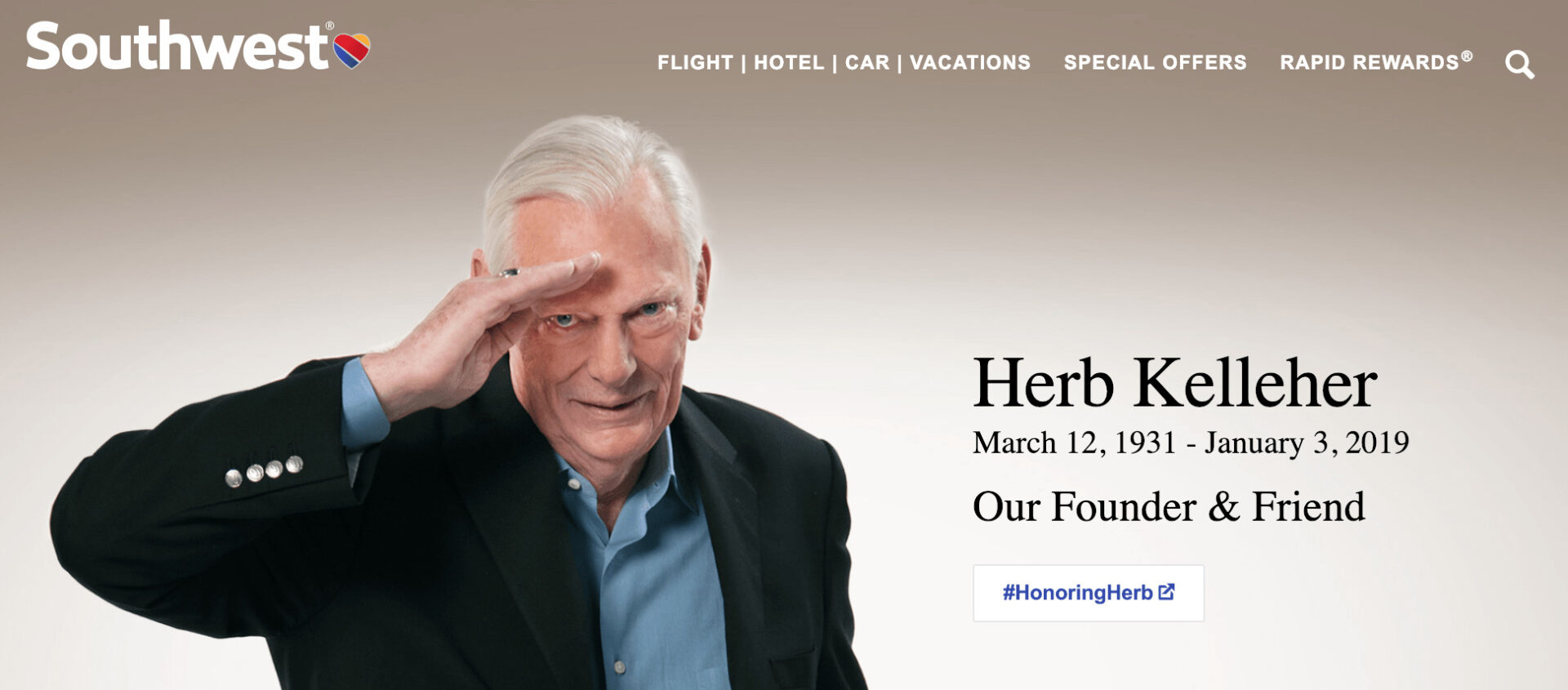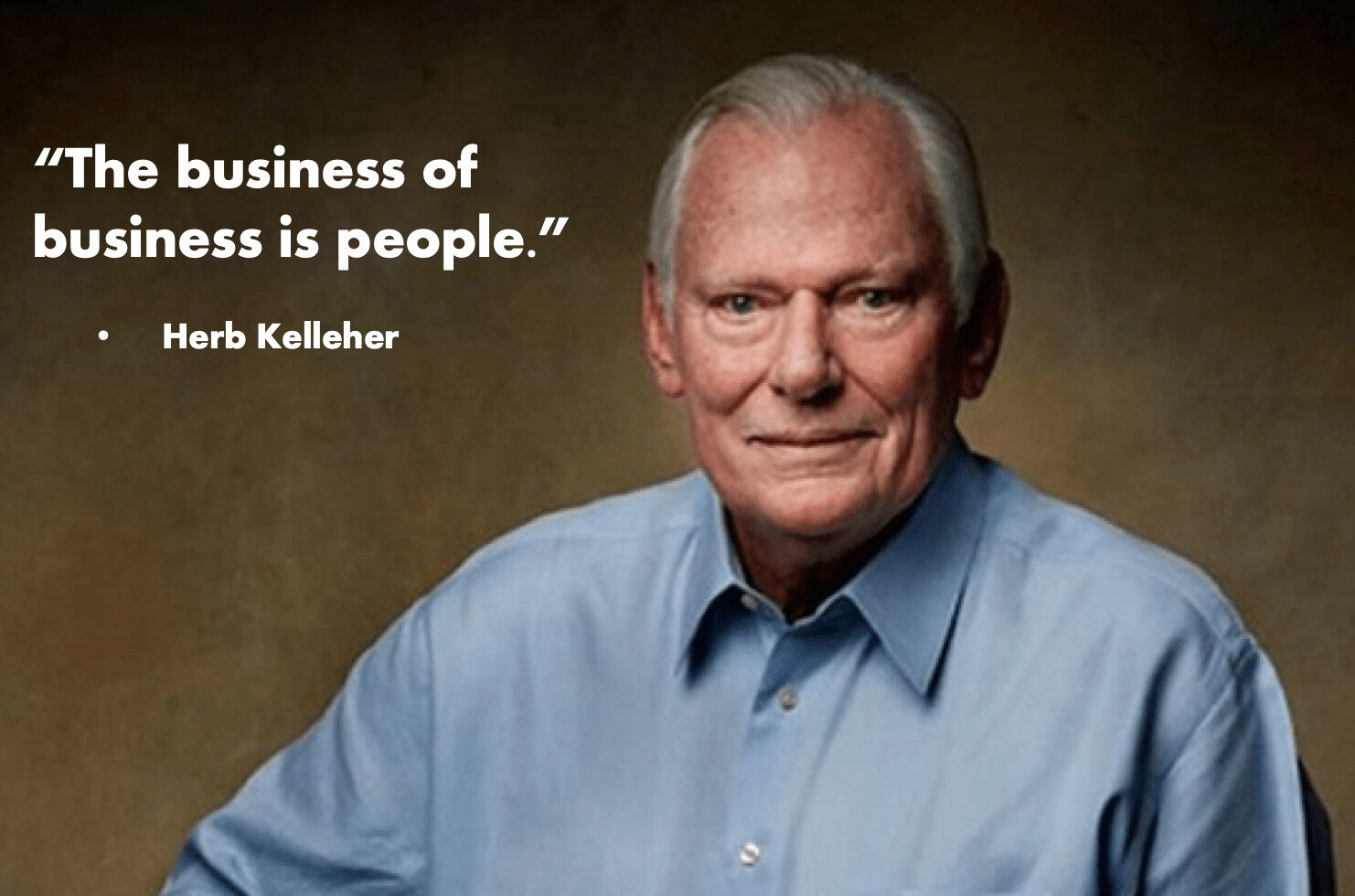Last week, Herb Kelleher passed away. He was the legendary founder, CEO, and Chairman of Southwest Airlines.
Southwest posted a nice tribute photo of him on the front of their website and also put up a special website HonoringHerb.org.

Kelleher was a legendary character and an upstart maverick who disrupted an industry.
I do remember hearing and reading about many stories about Kelleher engaging with employees in a way that seemed very authentic and enthusiastic. He seemed to be pretty well beloved and that's not always the case, especially if a CEO (or even middle managers) are distant from their employees (physically and emotionally).
One retired Dallas Morning News reporter who covered Kelleher shared some stories and observations in an article.
“For the time you spent with Herb, you were the only one who existed. You were his best friend, the person he'd rather be talking to than anyone else in the world. You were awash in the glow of his admiration.”
Terry Maxon, Dallas Morning News
The writer also points out that Kelleher wasn't faking this, with reporters or employees (and he interacted with other executives who could fake it):
“Whether it's hugging and kissing co-workers at a meeting or making a 2 a.m. visit to a maintenance hangar, Mr. Kelleher is not happy unless he's talking with employees.”
Terry Maxon, Dallas Morning News
How much better would other organizations be if they had leaders who respected (if not loved) their employees that way?
Current American Airlines CEO Doug Parker shared similar reflections about what a great listener Kelleher was (read more):
“He was the best listener I've ever met in my life,” Parker said. “You tell people that and they're kind of surprised (because) he always talks so much.”
His attention was always focused on the conversation. It didn't matter who else was in the room or walked into the room, Parker said.
“He was intently listening,” Parker said. “That was really helpful to me. What I realized is that's how he learned so much. And he really cared about what people had to say and their thoughts and where they came from. … I think that's how he go so well in touch with his people (at Southwest). That's how he got to know what was going on at his airline.”
Doug Parker
It's rare to run across that, especially in our increasingly noisy and distracted world. I never met Kelleher, but I got that same “you're the only one who exists right now” feeling when I had the chance to talk 1×1 with Stephen Covey before he passed away. It's really powerful when somebody gives you that gift of being present and fully attentive.
Their example inspires me to try to be a more present and attentive listener… and I often struggle or fail at this. It's something I can do better.
Visiting Employees
Kelleher was a breed of leader, like then-CEO of American Airlines Bob Crandall, who “went to the gemba” (as we'd say in Lean language) to visit and respect employees who were doing the value-adding work.
“He's found himself in many different places over the years — regularly loading luggage onto airplanes every Thanksgiving Day and cooking Christmas dinner at Ronald McDonald Houses in the cities where Southwest flies. He'll show up anywhere a Southwest employee is stationed, even if it means climbing over a locked fence to make a surprise reservations center visit.”
Terry Maxon, Dallas Morning News
Crandall was known for showing up on Christmas day to visit call centers and baggage operations, to show his appreciation. You can read Crandall's thoughts on Kelleher here.
Now, Lean leaders don't just shake hands and slap people on the back. Lean leaders observe work and listen to employees in the mode of a servant leader. But, being present (physically and emotionally) is a good start.
Current Southwest CEO Gary Kelly said, in part:
“His true impact can only be accurately measured by the hearts and minds of the People who he inspired, motivated, and engaged on a daily basis ….”
Gary Kelly
A Clumsy Attempt at “Engagement” in Manitoba Governme
It's a shame when executives don't know how to inspire, motivate, and engage others. I was reminded of this the other day when new Lean Blog contributor Ryan McCormack shared a
Gimmicks instead of going out into the workplace to talk with people.
From the news article Ryan shared:
An attempt by the Manitoba government to better engage with its employees — using a ceramic garden gnome — has come up short, says the president of the Manitoba Government and General Employees' Union.
Just before the holiday break, government employees were sent an email from the head of the province's civil service, introducing them to Gerome G. Gnome — a garden gnome billed as the government's “engagement champion.”
The real “engagement champion” should be the head of civil service, eh?
No, the “gnome” (named Gerome) is going to visit workplaces…
The email also promises that Gerome will be visiting government workplaces.
“I can't wait to meet you and help you share your stories about what you do, how you do it, and why it's so cool and important,” the email says.
Those are things that actual human leaders should do. That's what Herb Kelleher would have done, it seems.
To add insult to injury, the province is taking this “light-hearted” approach in an era of cost-cutting and layoffs.
A union leader said, understandably, that it's tone deaf and insulting:
“We are all for meaningful engagement and strong communication … but right now, when the people who deliver our public services are facing so much uncertainty … sending a ceramic statue around to government offices feels a little tone-deaf,” she said…
“These are adults that are providing needed services to Manitoba…. It just feels so, so wrong in my book. It just feels so insulting.”
“We don't need a ceramic statue to sit in between us while we communicate.”
Michelle Gawronsky, president of the Manitoba Government and General Employees' Union
Leadership > Gimmicks
Gnomes as a way to engage people? What a bunch of
A 1984 article about Crandall describes the “warmth the American Airlines employees feel for their leader” even though he pushed people to work hard and get results.
‘He expects people to do what they are asked,” said Richard Pearson, T.W.A.'s vice president, maintenance and engineering. ”In the process, he creates tremendous high morale and loyalty. We just didn't want anything to fail for him. He made us better than we were.”
It's not about being cuddly or cute (the ceramic gnome is cute, but not cuddly).
More Stories About Kelleher
“Herb Kelleher's genius was inspiring loyalty and joy among Southwest Airlines employees“
Kelleher possessed a humanizing frankness and spontaneity that most business executives would dismiss as needless vulnerability. But he brought personality with a purpose to the job and religiously won the loyalty of employees and air passengers in a way few executives ever have. Who else except Kelleher would have had the temerity to begin testimony before a national aviation review commission by saying:
“I co-founded Southwest Airlines in 1967. Because I am unable to perform competently any meaningful function at Southwest, our 25,000 employees let me be CEO. That is one among many reasons why I love the people of Southwest Airlines.”
Kelleher also said:
“The business of business is people.”
Herb Kelleher
So I created this image to share:

Here's another powerful message that I wish today's hospitals (and other airlines) would adopt:
“One key challenge in running any business is ensuring employees all the way down the line see beyond bureaucratic rules and make decisions that aid the company's success. At Southwest, there was no doubt from the baggage handler to the ticket agent to the agent at the boarding gate and on to the pilots and throughout the rest of the organization of what Kelleher would want
done in a specific situation: serve the customer regardless of what the rules were.”
Do what's right for the customer. Imagine that. Compare that to the lament of an employee at a different airline from a few years back: “An Airline Employee's Sad Lament: “They Won't Let Me Help You.“
I'll keep reading about Kelleher… I find it to be very inspiring. I hope you do too.
Some Fun Commercials
Here are some reminders of his humor and spirit of fun:
Please scroll down (or click) to post a comment. Connect with me on LinkedIn.
Let’s build a culture of continuous improvement and psychological safety—together. If you're a leader aiming for lasting change (not just more projects), I help organizations:
- Engage people at all levels in sustainable improvement
- Shift from fear of mistakes to learning from them
- Apply Lean thinking in practical, people-centered ways
Interested in coaching or a keynote talk? Let’s talk.
Join me for a Lean Healthcare Accelerator Trip to Japan! Learn More










There was an MIT Leaders for Manufacturing dissertation written about ten years ago by Ted Piepenbrock that studied “enterprise architectures.” It outlined two different approaches, “modular”, in which the company, shareholders, employees, suppliers, and customers were all interchangeable parts, and “integral” in which the opposite was true: companies, their shareholders, employees, suppliers, and customers were interlinked, committed, and interdependent on each others success.
Two companies most epitomized the “integral” enterprise: Toyota and Southwest Airlines. Contrast their performance with their competition: Detroit Three and “Big Four” US domestic airlines. (In addition to its renown customer service and employee focus, Southwest is also known for its “All Boeing fleet” of 737s, and has benefits, not only in reduced maintenance costs, but as “launch customer” for several new models of the airplane).
Herb was something special and he will be missed.
Thanks for sharing that.
Southwest seems like one of those companies, like Toyota, where it’s tempting to grab and copy just one part of a holistic system.
“Let’s force our pilots to help clean the planes.” Nope, that’s not gonna fly (pun intended) at American.
“If our flight attendants are funny, people will love us.” Probably not true with United.
People like Herb Kelleher have so much to teach us if we’re willing to learn.
I’m going to try Wild Turkey tonight. That’s the part I will copy. That will make me a success?
Here is another post from our friend Kevin Meyer:
Herb Kelleher: Creating Economic Value Based on Human Values
[…] written memorializing him, including this one by Bill Taylor in the Harvard Business Review and this one by our friend Mark Graban, but I’d like to reinforce a couple attributes that are important […]
Comments are closed.